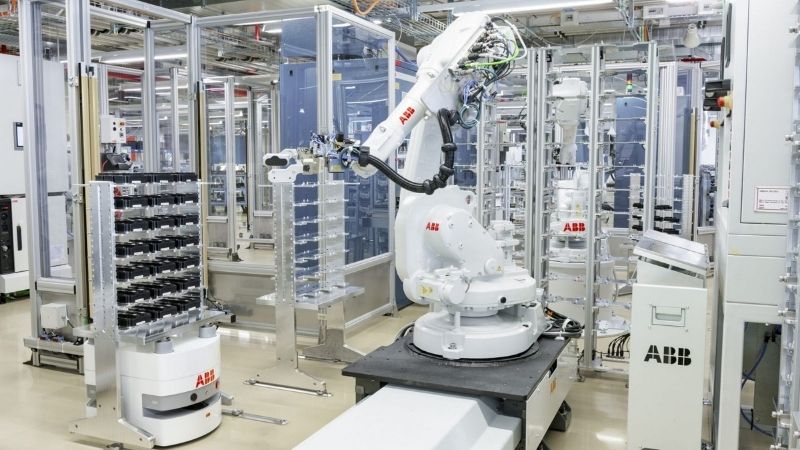ABB expands project to automate semiconductor factory
What started out as a small project to automate a single production stage has morphed into an award-winning program to digitally transform one of ABB’s own factories – in what is dubbed Project Genesis. (See video below.)
The power semiconductors produced by ABB pass through hundreds of production steps, from raw wafer dicing to the final semiconductor module.
Production of the BiMOS semiconductor – one of two types produced at Lenzburg, Switzerland – was labor intensive and tended to generate bottlenecks during high demand.
Kickoff 2013
“In 2013, we started to analyze how the efficiency of this production step could be enhanced,” recalls David Hajas, program manager for the BiMOS backend automation.

“In the process, we determined that many non-value adding processes, such as preparation, loading and unloading as well as transport of materials made up a considerable part of the workload.”
From concept to digital factory
Driverless transport vehicles, called automated guided vehicles (AGVs), are widely used to help automate the movement of materials in many different industries.
“An AGV is basically a riding robot which can be programmed and automated to serve as a supplier for stationary robots and systems,” Hajas explains.
“That gave birth to an idea that would really push us in the direction of the digital factory. If this area can indeed be automated, couldn’t we extend it over the entire backend area of BiMOS production?”
To support this idea, ABB’s higher-level control system, based on its Manufacturing Execution System (MES), was implemented.
“Yet we didn’t have a general contractor who would be able to implement the entire solution for us,” Hajas notes.
The big numbers game
ABB Semiconductors decided that it would take on the role of general contractor.
However, the scale of the challenge ahead was immense: the first phase comprised over 100 projects and sub-tasks, 55 robots – of which 40 were supplied by ABB, some 30 special installations and the integration into the MES of 100 existing equipment facilities.
Yet despite this, one of the biggest challenges faced by Project Genesis was to automate an existing production facility, without having to excessively restrict its operation.
Valuable insights
To help gather know-how of such automation projects, in 2015 the newly formed team at ABB Semiconductors set about building a demonstration system.
The demo comprised six ABB robots, AGVs and various special automated installations and was used to prove the technical feasibility on a smaller scale while developing new concepts from the insights obtained.
“The experience that we gained from this pilot installation and from cooperation with each of our partners was critical to be able to really implement the entire project,” Hajas explains.
Continuous data exchange with ABB MES
The Genesis team aimed to use as many components from within the ABB group as practical. “What emerges from all of this is a true digital factory,” Hajas emphasizes.
All the systems and robots are constantly exchanging information with the higher-level ABB MES. The result is that many different products can be simultaneously processed in the same robot cell.
A control room enabled with ABB Ability™ Manufacturing Operation Management (MOM) helps to pick all relevant product and process information and provides a centralized and remote place for decisions, steering as well as controlling the line by one person.
Robots retool the system
Meanwhile, the retooling and non-value adding transport processes are fully automated, such that the robots retool the systems on their own.
As a result, a highly agile production process has emerged which adjusts itself autonomously, depending on what needs to be produced at a given moment.
AGVs handle the transport of materials between the cells, based on instructions provided by the MES. One person can monitor and control the entire production process from the control room. The data needed to do so is supplied to the MES through vertical integration.
Important interface definition
“The most important tasks for the Genesis team include creating the total concept, designing the specifications of systems and interfaces and managing the interfaces between the systems,” Hajas notes.
“Flawless communication and interaction between these elements is what really makes Industry 4.0.”
Initial commissioning in November 2018
The first robot cell to test various power semiconductor modules was commissioned in November 2018. Following this a total of 20 ABB robots, including a YuMi, are to be tested, with production roll-out within a few months.
By the end of 2019, cells for so-called substrate production, another part of the BiMOS backend process will be introduced. This will complete the first phase of Genesis.
Flagship and showcase factory
Following this, ABB Semiconductors plans to demonstrate automated production with an unparalleled level of complexity.
The facility will also serve as a flagship and showcase factory which will show what can be done with robots and Ability solutions from ABB.
Factory of the Year Award for securing local business
ABB Semiconductors has already received an award in the prestigious “Factory of the Year 2018” industrial competition in the “Excellent Location Safeguarding by Digitalization” category.
The prize was awarded not just for “Genesis,” but for the entire digitalization strategy of the product unit.
https://www.youtube.com/watch?v=rjT1klsy-1c&feature=emb_logo&ab_channel=HitachiABBPowerGrids

